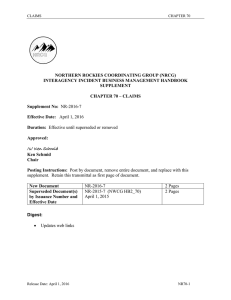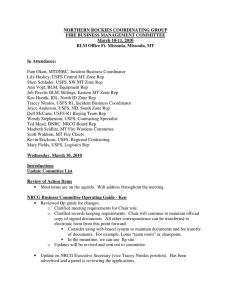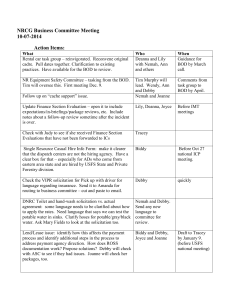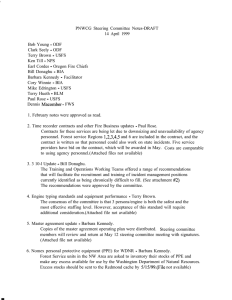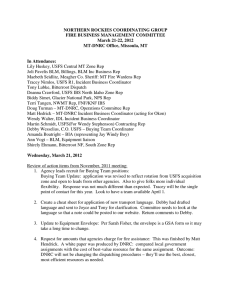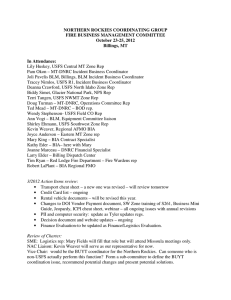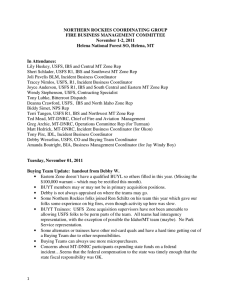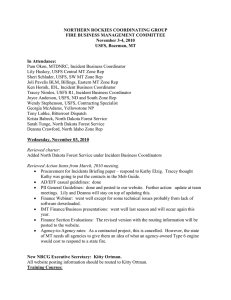NORTHERN ROCKIES COORDINATING GROUP INCIDENT BUSINESS MANAGEMENT COMMITTEE March 19-20, 2013
advertisement
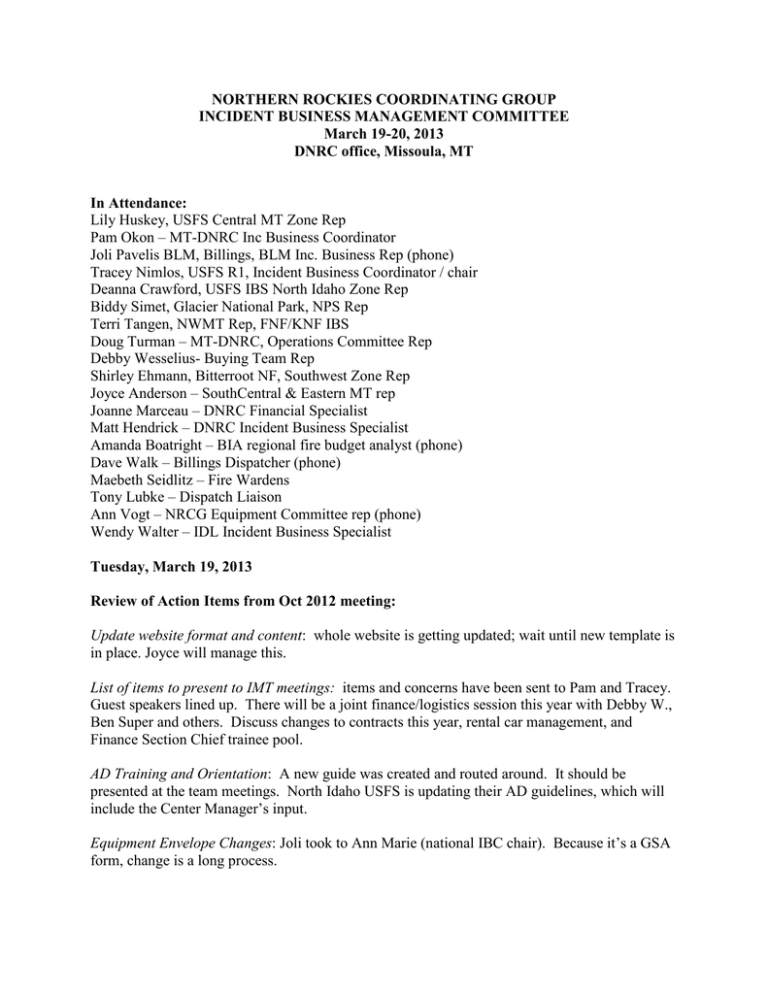
NORTHERN ROCKIES COORDINATING GROUP INCIDENT BUSINESS MANAGEMENT COMMITTEE March 19-20, 2013 DNRC office, Missoula, MT In Attendance: Lily Huskey, USFS Central MT Zone Rep Pam Okon – MT-DNRC Inc Business Coordinator Joli Pavelis BLM, Billings, BLM Inc. Business Rep (phone) Tracey Nimlos, USFS R1, Incident Business Coordinator / chair Deanna Crawford, USFS IBS North Idaho Zone Rep Biddy Simet, Glacier National Park, NPS Rep Terri Tangen, NWMT Rep, FNF/KNF IBS Doug Turman – MT-DNRC, Operations Committee Rep Debby Wesselius- Buying Team Rep Shirley Ehmann, Bitterroot NF, Southwest Zone Rep Joyce Anderson – SouthCentral & Eastern MT rep Joanne Marceau – DNRC Financial Specialist Matt Hendrick – DNRC Incident Business Specialist Amanda Boatright – BIA regional fire budget analyst (phone) Dave Walk – Billings Dispatcher (phone) Maebeth Seidlitz – Fire Wardens Tony Lubke – Dispatch Liaison Ann Vogt – NRCG Equipment Committee rep (phone) Wendy Walter – IDL Incident Business Specialist Tuesday, March 19, 2013 Review of Action Items from Oct 2012 meeting: Update website format and content: whole website is getting updated; wait until new template is in place. Joyce will manage this. List of items to present to IMT meetings: items and concerns have been sent to Pam and Tracey. Guest speakers lined up. There will be a joint finance/logistics session this year with Debby W., Ben Super and others. Discuss changes to contracts this year, rental car management, and Finance Section Chief trainee pool. AD Training and Orientation: A new guide was created and routed around. It should be presented at the team meetings. North Idaho USFS is updating their AD guidelines, which will include the Center Manager’s input. Equipment Envelope Changes: Joli took to Ann Marie (national IBC chair). Because it’s a GSA form, change is a long process. Create a template of the changes that can be printed on a sticker and added to the package, as needed. Lily has the edits and can make up a sticker template. BIA and BLM Payment offices want shift tickets every day for rental cars. Those agencies will need to inform the teams upon inbriefing that daily shift tickets are required not just a single ticket with first and last day. Identify our finance folks and look at the time line for their next qualification. Completed an S360 course this year. Most Type 2 teams have 1 or two people in addition to FSC. Suggestion: identify fully qualified folks and ask them to mentor a trainee when they go out. ICPI position: Per Debby W: training is the week of April 22, still accepting nominations. Curriculum is still in draft form. Nationally: training was cancelled in Region 4 and 6. Still on for Region 9. National IBC says the position works for the PROC, but in the Northern Rockies we had to float the folks among fires so they weren’t assigned to a particular team. Region 6 has adopted the position as part of a T1 team. Other regions utilize them more as inspectors in Ground Support. Southern Idaho used 2 this year and they also needed to assign them to several fires (similar to R1 administration). This function is more like an IBA who has several fires to assist. Update the rental car cheatsheet: revised by Joyce and Pam. Problems: • huge lack of inspections on rental cars • Return of vehicles • people who get reassigned to another fire take the vehicles without it getting reassigned on a resource order. New cheatsheet is on the DNRC website. Should be download and emailed to Dispatch Center Managers and Finance Section Chiefs as well as added to our new toolbox. Concern about inspecting a batch of vehicles that may arrive on incident via carrier. Who does the inspections, when and where? Could be done both ways depending on where they were delivered. Some were delivered to dispatch centers and inspected, others went to the fires. Dispatchers workshop topics: Pam and Tracey attended the workshop. Talked about rental cars and inspections, Buying Teams, finance trainee pool. All topics that were submitted were covered. Contracting extension form process: Misunderstanding that contractors are exempt from extension process. Operators must meet R&R work/rest, but they are not restricted to the 30 days max per incident. The correct, current operator needs to be listed on the shift ticket and some documentation of the decision to keep equipment beyond 14 days is needed. This should be discussed between Plans/Logistics and Finance. Plans should be tracking the 14 day and notify that a decision point is needed. When operators are swapped out at the incident, the team is responsible for assuring the replacement operator is qualified. The new operator should go through the check-in process and their quals should be checked. There’s a website that dispatchers can use to verify certifications. Plans can also call dispatch to check to see if the new operator is on the website as qualified. If the person is not listed the team is responsible for checking the new person’s qualifications. Lily and Deanna will work on updating the existing extension form to be appropriate for contractors. Revised transport language: Debby W: National template was changed somewhat. We need to refer to the actual language in the template or contract. Update Fire 101 content: Updates are on the ftp website. A 12-page document is there. It helps people find the information that they need. It can be used as a basis for local trainings and focus on the sections as needed. S260 course: still needs exercises revised. Time Unit Leader position upgrade: not supported by NWCG (mostly the DOI agencies). Apparently R1 is the only region short on PROCs. Also, the evolving incident management process that’s ongoing may influence what a finance section looks like in the future, this has been tabled. USFS folks will take a run at this by trying to eliminate the 5109.17 requirement that PROCs need a warrant. If we delete that, the qual would be the same as the 310-1 and it may free up more folks to become PROCs. If we had more PROCs that may take some pressure off TIMEs. Finance Evaluations: Will be renamed “Fiscal Evaluation.” Finance issues may not be identified until later – this may also be the case with logistical issues because they’re so tied together. Fiscal issues are tied into logistics and operations as well. Checklists for personnel and equipment time: Done. Will be added to the website tool box. DNRC information is being updated. Idaho may have additions as well. Updates or changes to Transition documents and Quick Cost estimator: Done. Will be added to the website tool box Decision Document: rename to Interagency and Template: Completed, but Tracey needs to add “template” to the new version that’s on the website. Mini-Guide: completed. Lily needs to review one more time and make it available on the website. Type 3 workshops: Joyce and Lily partnered to create workshops on their forests in Bozeman and Billings. Workshop will simulate an emerging incident, will go over logistics, planning and finance. Will do 2 scenarios – one emerging incident from scratch, and the second will be a transition back to the home unit. All materials are on the ftp site; could be a template for anyone to use. Lily and Joyce will share lessons-learned and recommendations. IMT Meetings: due to travel restrictions, the NRCG BOD said on today’s call that primarily C&G will show up. BLM said C&G, FWS said C&G, BIA said nobody, USFS and DNRC have no restrictions. So there may be 30-40 fewer people. Tactical Tender: Ops committee would like a rate and see if it gets used this year. A rate will be included in Chapter 50, but not in Chapter 20 this year as we don’t know if private tenders exist. Problem is: they can’t multi-type. So, currently most pieces of apparatus that qualify as a tactical tender are already typed as a Type 3 engine. They can’t be in ROSS as both. They’d have to be on a resource list as a tactical tender. States with reciprocal worker’s comp agreements: Completed. Added to Chapter 20 Command Vehicle issue to Equipment Committee to review appropriateness of rates: Ann was going to request info from the equip committee. Operations committee said we don’t need command vehicles, but they did say that the vehicle rate in Chp 20 was too low. (No pick-up rates in Chp 50 – DNRC refers to Chp 20). Chapter 20 rates are more for on-road rather than fire-use off road. Debby’s suggestion: look at the awards this year and see how that averages out. Local government is not making a profit so the rate wouldn’t be exactly comparable to the solicitation. Need to consider the additional wear-and-tear for off road – would that be a mileage addition or added to the daily rate. Add a daily rate to Chapter 50 for local government vehicles – daily rate, no mileage. Revise Charter: Done and on the website. Equipment Inspector AAR: Pam attended this AAR and explained issues. She recommended better documentation for condition of vehicles and equipment. She also asked for a new inspection for each fire that a vehicle may be dispatched to. The lack of release inspections when vehicles were reassigned was an issue. Buying Team Task Group Report and Application: Misconceptions among buying team members about dispatch procedures, team typing and configurations. Some of this was clarified at the AAR. Pam Jolly wrote up a dispatch-terms and definitions paper that can be routed to buying team members to assist them with dispatching procedures. The task group wrote up recommendations for the business committee to review. Northern Rockies short buying teams will be hosted at the Northern Rockies Coordination Center. For the USFS, the AQM zones can provide a fair amount of support to smaller incidents. Host agency will decide when a buying team is needed. Business Committee decision: move forward with the short-team idea with Debby’s concerns in mind. Mention that short-buying team members do not need to have a completed Taskbook. Clarify that folks would be on a short team or a national team, but probably not both. Supplement review: Chapter 10: • DNRC EFF rates may change later, but haven’t yet and may not before we need to publish our supplements. We may need to send out an interim directive later. • Tim made a request to upgrade EFF pay rate for ICPI and heavy equipment tech specialist. ICPI was set nationally in USFS and DOI pay plans at AD-G this year so we want to avoid a discrepancy. Pam will contact Tim regarding the difference. Completed Chapters 0, 10 and 30. Wednesday, March 20, 2013: Chapter 20: • Need the “wet” rate on POV Pick-Up with Drivers. • Exhibits will be identified by letter rather than number: For example, a Chapter 20 exhibit would be: Exhibit 20-A, page 20-14. • Transports: discussion of transport rate language and 8-hour vs. half-day rate. The transport rate will be paid at the half-day rate if the transport is under hire for less than 8hours. Could also refer to one-half of the 65% rate if there’s only one operator. Finance sections will need to check the travel time on the heavy equipment to check departure, then will need to follow-up to determine when the transport departed and returned to its home unit – to determine if time-under hire was over or under 8 hours. • Contract claims settlement: MT and ID do not delegate the authority to settle contract claims to IMTs. MT contract claims can be settled at the incident by MT Line Officers. IDL contract claims cannot be settled at the incident. Language was changed in the supplement. • Need input from Kevin Erickson about equipment inspector quals on the Certification forms. • Water Truck Requirements appear to duplicate the Water Tender Requirements even though the truck should not be fireline active. Need clarification from Kevin. Chapter 50: • Need to clarify language about hiring Ambulances for Idaho. Wendy will send clarification. • Tracey will request North Dakota Chapter 50 changes. Wendy needs to complete IDL section of Chapter 50. • DNRC: Discussion of R&R – need to defer to the 300 Manual rather than try to reiterate the language in Chapter 50. Other: • Joyce is going to organize the website “toolbox” to include forms, checklists, etc. that currently are on the website under each chapter. Reviewed Finance Section Rosters IMT Meetings – Finance & Logistics Breakout Topics Tracey and Pam handed out topics from the Finance Section Chief telephone AAR. Reviewed items that this committee may be able to address. Notes will be taken and distributed from the Finance breakout at the IMT meetings. • Better documentation for accidents involving all vehicles: agency, rental and contractorowned. This should be addressed at the IMT meetings. • Incident replacement: clarification between logistics and supply • Incident resupply: standard and non-standard cache items, durable and consumable Reviewed Finance Webinar Topics: will use some of the topics from the Finance Section Chief AAR and the IMT meetings. Fall Meeting: Follow the Ops Committee meeting in Helena, October 16-18. Tentatively begin at 1300 on 10/16 and finish either end of the day on 10/17 or noon on 10/18 depending on agenda. Lily will make arrangements and provide lodging information.
